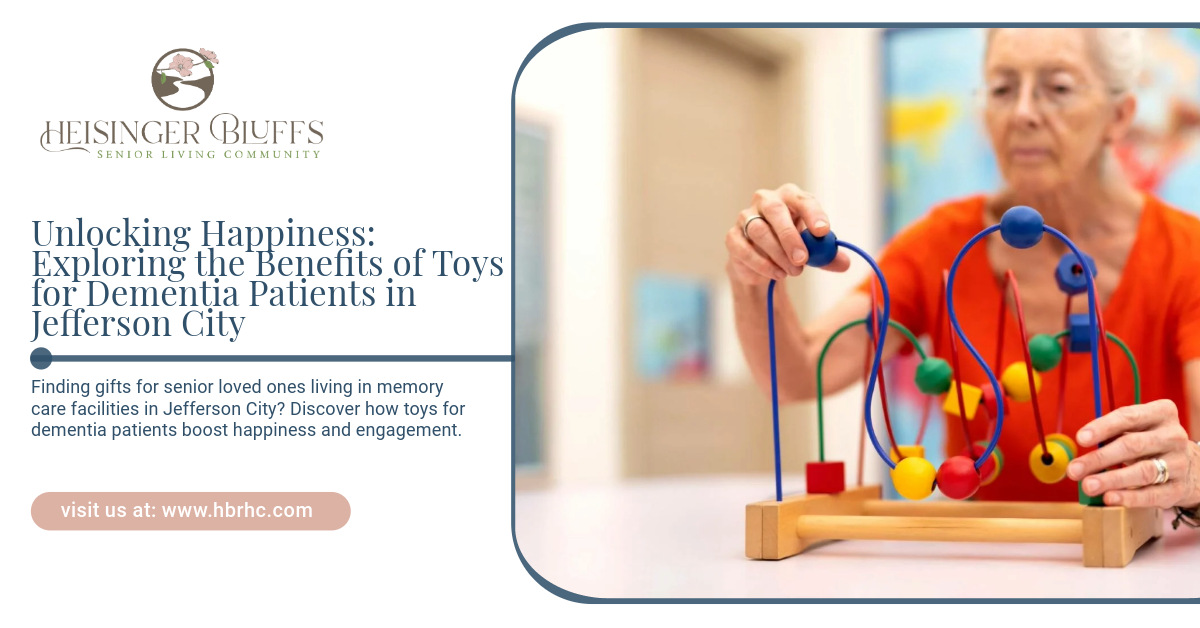Unlocking Happiness: Exploring the Benefits of Toys for Dementia Patients in Jefferson City

Dementia is a challenging condition that affects millions of individuals worldwide, including many seniors in Jefferson City. While the symptoms of dementia can lead to frustration and confusion, incorporating playful activities and toys into daily routines can provide comfort, joy, and engagement. This article explores the significant benefits of using toys for dementia patients, offering insights into how these tools can unlock happiness and improve quality of life.
Understanding Dementia
Dementia is not a single disease but an umbrella term that encompasses various symptoms affecting memory, thinking, and social abilities severe enough to interfere with daily life. Alzheimer’s disease is the most common form of dementia, but other types include vascular dementia, Lewy body dementia, and frontotemporal dementia.
Common Symptoms of Dementia
The symptoms of dementia can vary greatly depending on the individual and the type of dementia they have. Common symptoms include:
- Memory loss
- Difficulty communicating or finding words
- Confusion and disorientation
- Changes in mood and behavior
- Difficulty with problem-solving and planning
- Withdrawal from social activities
Understanding these symptoms is crucial in finding ways to provide support and enhance the quality of life for those living with dementia.
The Role of Play in Dementia Care
Play is often associated with childhood, but it plays an equally important role in the lives of seniors, especially those with dementia. Engaging in play can help stimulate cognitive function, improve emotional well-being, and foster social interaction. Here’s how toys can help dementia patients:
1. Cognitive Stimulation
Toys designed for cognitive engagement can stimulate brain activity. Simple puzzles, memory games, and sensory toys encourage seniors to think critically, exercise their memory, and maintain cognitive skills. This stimulation can slow cognitive decline and promote mental agility.
2. Emotional Well-Being
Toys can evoke positive emotions and memories. Soft plush animals, for example, can provide comfort and security, reducing anxiety and agitation. Familiar toys from a person’s past may trigger happy memories, promoting feelings of nostalgia and joy.
3. Social Interaction
Play often encourages interaction, whether it’s playing games with family members or engaging in group activities with peers. Toys that require teamwork or cooperation can facilitate socialization, helping to combat feelings of loneliness and isolation that many dementia patients experience.
4. Physical Activity
Some toys encourage movement, whether it’s tossing a ball or engaging in physical games. Keeping physically active is essential for maintaining overall health and mobility, which can significantly impact the quality of life for seniors.
Types of Toys Beneficial for Dementia Patients
When selecting toys for dementia patients, it’s important to consider the individual’s preferences, abilities, and needs. Here are some effective types of toys that can enhance happiness and engagement:
1. Sensory Toys
Sensory toys can engage multiple senses—sight, sound, touch, and smell. These toys often include:
- Fidget blankets: Soft blankets with various textures and items sewn in for tactile engagement.
- Sensory balls: Textured balls that are easy to grip and encourage movement.
- Weighted blankets: Provide comfort and can help reduce anxiety.
2. Reminiscence Toys
Reminiscence toys are designed to evoke memories and spark conversations about the past. These may include:
- Photo albums or memory boxes: Containing pictures and mementos from the past.
- Classic games: Like dominoes or cards that may remind individuals of happy times spent with family.
3. Puzzles and Brain Games
Simple puzzles, crossword puzzles, and Sudoku can offer cognitive engagement. These toys challenge the brain without being overly complex, making them accessible for those with cognitive impairments.
4. Plush Toys and Dolls
Soft toys can provide comfort and companionship. Dolls that resemble babies or pets can evoke nurturing instincts and create a sense of purpose.
5. Music and Rhythm Instruments
Music has a powerful impact on emotions and memory. Instruments like tambourines, maracas, or even simple music players with familiar tunes can help stimulate memories and promote happiness.
6. Interactive Technology
For some seniors, technology can be a valuable tool. Tablets or devices with simple apps for games, music, or virtual reality experiences can be engaging and stimulating.
Best Practices for Using Toys with Dementia Patients
To maximize the benefits of toys for dementia patients, caregivers and family members should consider the following practices:
1. Tailor to Individual Preferences
Understand the interests and preferences of the individual. Some may enjoy puzzles, while others may prefer musical activities or tactile engagement. Choose toys that resonate with their past experiences and likes.
2. Create a Safe Environment
Ensure that the area where toys are used is safe and free from hazards. Soft, cushioned areas can help prevent injuries during play.
3. Encourage Participation
Encourage involvement but avoid forcing participation. Let the individual engage with toys at their own pace. If they show interest in a particular activity, be supportive and engage with them.
4. Incorporate Family and Friends
Use toys as a means to bring family and friends together. Encourage group activities where everyone can participate, fostering social connections and enjoyment.
5. Monitor Engagement
Observe how the individual interacts with different toys. If certain toys elicit positive responses, incorporate them more frequently into activities. Conversely, remove toys that cause frustration or anxiety.
Benefits for Caregivers
The positive effects of using toys extend beyond the dementia patients themselves; caregivers also benefit from the engagement that these activities promote:
1. Easier Communication
Playful activities can make communication more natural and relaxed, reducing tension and misunderstandings between caregivers and dementia patients.
2. Enhanced Relationships
Engaging in playful activities fosters deeper connections and strengthens relationships. Shared experiences can create joyful moments that become cherished memories.
3. Reduced Stress Levels
Seeing a loved one engaged and happy can alleviate the stress and burden caregivers often face. Toys can serve as a tool for connection, allowing caregivers to feel more fulfilled in their roles.
Conclusion
Toys for dementia patients in Jefferson City can unlock happiness, enhance emotional well-being, and provide meaningful engagement. By incorporating play into the daily lives of those with dementia, caregivers can help alleviate symptoms, promote social interaction, and foster a sense of joy. Whether through sensory toys, reminiscence activities, or games, the power of play is undeniable.
At
Heisinger Bluffs, we are committed to providing resources and support for families navigating dementia care, helping to enhance the quality of life for both seniors and their loved ones.
Sources:
- https://www.mayoclinic.org/diseases-conditions/alzheimers-disease/symptoms-causes/syc-20350447#
- https://www.nhs.uk/conditions/dementia/symptoms-and-diagnosis/symptoms/
- https://pmc.ncbi.nlm.nih.gov/articles/PMC11478890/
- https://www.alzheimers.org.uk/get-support/staying-independent/loneliness-depression-dementia











